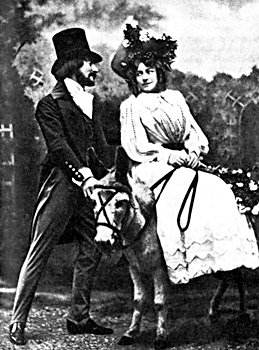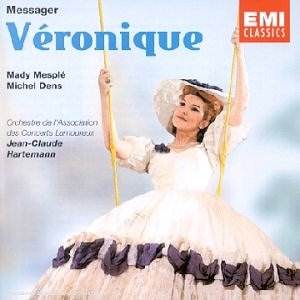
What waltz and dance music did for Vienna,
the opéra comique did for Paris. Offenbach
was the composer who lit the way and built
on Auber’s Fra Diavolo by making available
the new genre (read Ganzl), one that was bubbly
and effervescent, light, flowery, bright and
easily accessible. Offenbach lit the way for
new up-and-coming composers who wished to
try their luck in writing for the stage in
this novel genre. One who was successful was
Messager. Offenbach’s new style flooded London
from the 1860s onwards. In Britain this French
opérette was eventually eclipsed by
the rise of the Savoy comic operas of Gilbert
& Sullivan two decades later. Yet ironically
it was Messager with his La Basoche
who came to D’Oyly Carte’s rescue to keep
his new English Opera House open when no English
work was in place to replace the long run
of Ivanhoe (Sullivan). Of Messager’s
works, Véronique is one of the
best remembered in Britain, partly because
Eric Robinson’s BBC orchestral concerts to
the rising television public exposed the hit
Véronique song, ‘Here and
There’ (De ci, de là).
André Messager
was born in central France at Montluçon.
With a musical interest in keyboard instruments
he had a leaning to the organ. He studied
at the Ecole Niedermeyer under the eminent
masters Saint-Saëns and Fauré
who became lifelong friends. By 1878 he had
had a symphony performed and was writing prize-winning
cantatas. In contrast to this serious output
he provided little divertissements, ballets
for the Folies Bergères, which
provided useful income. His rise to fame came
with two opéra-comiques written in
1885– La Fauvette du Temple and La
Béarnaise, both of which received
long runs and were exported to London and
New York. The critics liked his orchestration
since it revealed a classical suppleness and
charm lacking in the French compositions of
Planquette and Lecocq which were then being
performed alongside Offenbach. Five years
later his compositions were at their best.
In 1890 La Basoche played at the Opéra-Comique
and opened a new chapter. Telling the story
of a student crowned "King of the Basoche’,
an ancient law guild and mistaken for the
real King, the music was warmly praised for
restoring gaiety to the stage of the Opéra-Comique.
Its score was considerably heavier than his
usual stage compositions. (No recording of
the work exists though it was broadcast by
the BBC under Beecham? in the 1920s.)
Véronique opened
in 1898 and was set in a romantic period of
French fashion, the 1840s, which had some
appeal in itself. It is of course a love story
surrounding two central characters, Florestan
and Véronique. After a vibrant overture,
the operetta takes little time to warm up.
For the entrance of Hélène (Véronique)
Messager is musically at his strongest, using
wind and strings to provide a perfect and
magical effect. Florestan appears with a lilting
song which is not particularly inventive and
is similar to songs from the pen of Lecocq
or Planquette. But it contrasts nicely with
Messager’s ambitiously written quartet, Charmant,
charmant, that follows. The Act 1 finale
is recognisably Offenbach in rhythm and strong
beat. Two hits are the catchy – De ci,
de là (Trot here, trot there)
(mentioned above), and a flowery Swing
song, heard later. Act 3 is notable for
its comic duet with a refrain which wins Messager
to the heart. Messager’s compositions are
generally flowery, elegantly light in orchestral
colour, and generally have a vocal line often
shadowed by the orchestra (à la Offenbach)
yet sometimes exhibiting a typically ‘music
hall’ effect. His gift lies in warm melodies
and harmonies that are easy on the ear.
The soloists both sing and
act well with the required element of fun
included. It helps to be able to follow the
French dialogue (though this is tracked separately
so that a CD player may be programmed to play
the music alone). Mady Mesplé (Hélène/Véronique)
needs no introduction to recordings of French
opérette with her distinctive, light
and thinly textured soprano voice with clear
pronunciation and rapid vibrato. Michel Dens
(Florestan) is less well known; he previously
sang in Pathé EMI’s previous production
of L’Auberge du Cheval blanc in 1962
and a year after this recording sang in Pathé
EMI’s Le Pays du Sourire. His rich
warm tone ideally fits the part with strong
delivery.
This 2 CD set is a reissue
of LPs released in the 1970. The recording
master tapes have not deteriorated with age
and the transfer to CD is excellent. However,
the track indexing is poor. With this mid-price
issue, no notes are included.

’Trot here, trot there’
–the song which made Véronique famous
Raymond Walker

![]() Mady Mesplé (Hélène),
Andrea Guiot, Denise Benoit, Michel Dens (Florestan),
Mady Mesplé (Hélène),
Andrea Guiot, Denise Benoit, Michel Dens (Florestan), ![]() EMI 72435 7407328 [CD1
48.46 CD2 47.33]
EMI 72435 7407328 [CD1
48.46 CD2 47.33]

